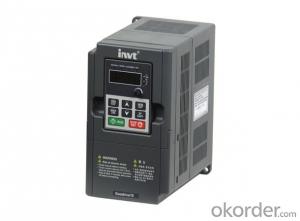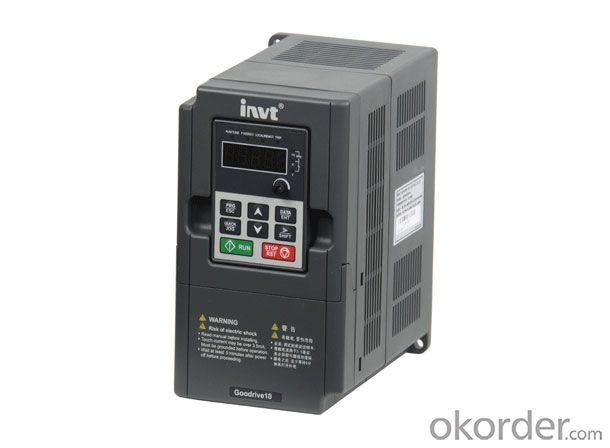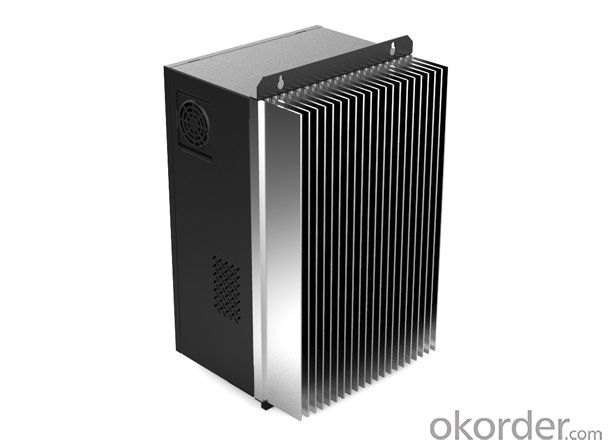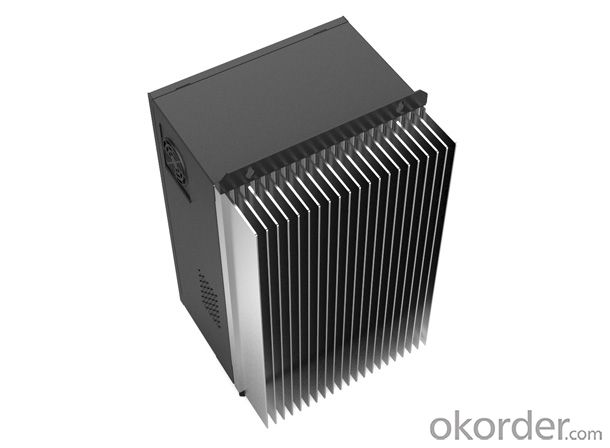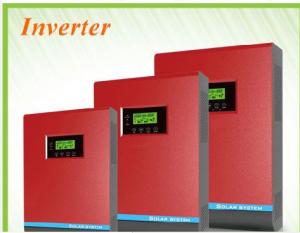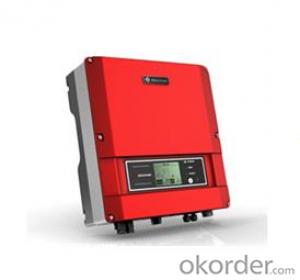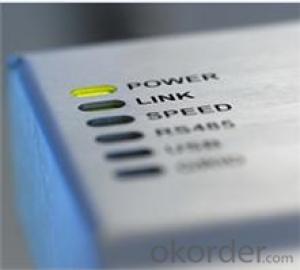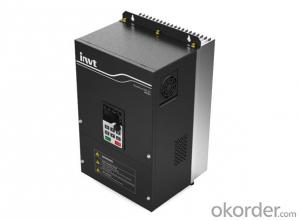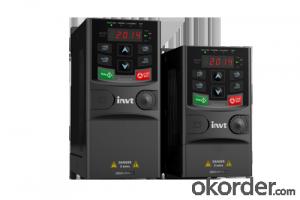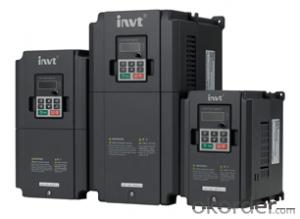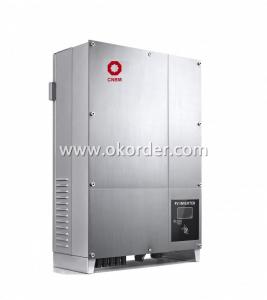Easy Solar Inverter - Goodrive10 Series Mini Inverter with Full Certification
- Loading Port:
- China main port
- Payment Terms:
- TT OR LC
- Min Order Qty:
- 100 pc
- Supply Capability:
- 10000 pc/month
OKorder Service Pledge
OKorder Financial Service
You Might Also Like
Goodrive10 Mini economic inverters are developed for general applications of small power and OEM market. It applies V/f control technology, making the functions of PID, multiple-speed step, DC braking, Modbus communication, as well as less installation space (15% smaller than the counterparts) available.
Goodrive10 Mini economic inverters are developed for general applications of small power and OEM market. It applies V/f control technology, making the functions of PID, multiple-speed step, DC braking, Modbus communication, as well as less installation space (15% smaller than the counterparts) available.
1AC 220V -15% ~ +10%, 0.2KW – 2.2KW
3AC 220V -15% ~ +10%, 0.2KW – 2.2KW
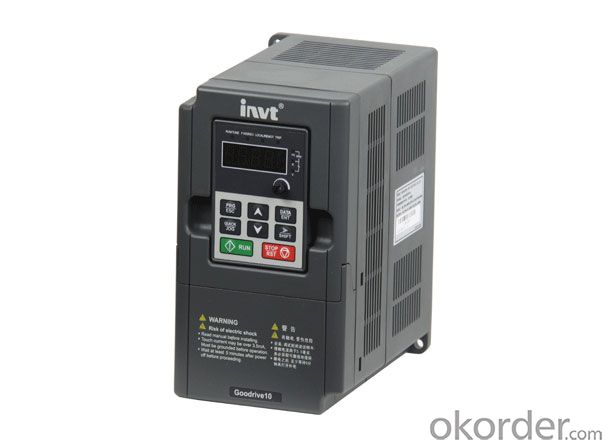
FAQ:
Q: Can you help us install the module if we cooperate with you?
A: We haven’t entered into installation sector, but we have the plan in near future.
Q: How do you pack your products?
A: We have rich experience on how to pack the panels to make sure the safety on shipment when it arrives at the destination.
Q: Can you do OEM for us?
A: Yes, we can.
Q: Can we visit your factory?
A: Surely, I will arrange the trip basing on your business schedule.
- Q: How does the efficiency of a solar inverter affect the overall system performance?
- The efficiency of a solar inverter plays a critical role in determining the overall system performance. A higher efficiency inverter converts a greater percentage of the incoming solar energy into usable electricity, resulting in increased energy production. This ultimately leads to higher system output and improved performance. Additionally, a more efficient inverter reduces energy losses and improves the overall system's reliability and longevity. Lower efficiency inverters, on the other hand, can result in energy wastage and reduced system performance. Therefore, selecting a highly efficient solar inverter is essential for maximizing the overall performance and energy output of a solar power system.
- Q: What are the safety certifications to look for in a solar inverter?
- When looking for safety certifications in a solar inverter, some important ones to consider include the UL 1741 certification, which ensures compliance with safety standards for grid-connected inverters, and the IEC 62109 certification, which verifies the safety of the inverter in regards to electrical and fire hazards. Additionally, certifications such as CE, TÜV, and ETL mark can also indicate compliance with safety standards and regulations.
- Q: Can a solar inverter be used in a net metering system?
- Yes, a solar inverter can be used in a net metering system. A solar inverter is an essential component of a net metering system as it converts the direct current (DC) produced by the solar panels into alternating current (AC) that can be used to power homes or businesses. It also allows for any excess electricity generated to be fed back into the grid, earning credits or reducing the electricity bill through the net metering arrangement.
- Q: What is the role of a solar inverter in a residential system?
- The role of a solar inverter in a residential system is to convert the direct current (DC) electricity generated by the solar panels into alternating current (AC) electricity that is suitable for use in the home. It also manages the flow of electricity, monitors the system's performance, and ensures safety by providing protection against electrical faults.
- Q: How does a solar inverter handle sudden changes in solar irradiation?
- A solar inverter handles sudden changes in solar irradiation by constantly monitoring the incoming solar power and adjusting its output accordingly. It has built-in technology and algorithms that enable it to quickly adapt to changes in solar irradiation levels. The inverter can efficiently convert and regulate the fluctuating DC power from the solar panels into a stable AC power output, ensuring a smooth and consistent energy supply to the connected load or grid.
- Q: How does a solar inverter communicate with other devices?
- A solar inverter typically communicates with other devices through wired or wireless connections. It can use protocols like Modbus, RS485, or Ethernet to establish communication with monitoring systems, smart meters, or other devices. This allows for data exchange, control signals, and monitoring capabilities, enabling efficient management and integration of the solar power system with other components of a renewable energy infrastructure.
- Q: What is a solar inverter?
- A solar inverter is a device that converts the direct current (DC) electricity generated by solar panels into alternating current (AC) electricity that can be used to power household appliances and be fed back into the grid.
- Q: How does a solar inverter handle high temperatures?
- A solar inverter handles high temperatures by incorporating various cooling mechanisms such as heat sinks, fans, and thermal management systems. These components help dissipate heat generated during the inverter's operation, preventing overheating and ensuring optimal performance even in hot climates.
- Q: Can a solar inverter be used in systems with different module types?
- Yes, a solar inverter can be used in systems with different module types. Solar inverters are designed to convert the DC power generated by solar panels into usable AC power for homes or businesses. They typically have a wide input voltage range and are compatible with various module types, including monocrystalline, polycrystalline, and thin-film panels. However, it is essential to ensure that the inverter's specifications are compatible with the specific module types being used to optimize efficiency and performance.
- Q: Can a solar inverter be used for both residential and commercial applications?
- Yes, a solar inverter can be used for both residential and commercial applications. Solar inverters are designed to convert the direct current (DC) electricity generated by solar panels into alternating current (AC) electricity, which is suitable for use in homes and businesses. They are versatile and can be scaled up or down depending on the size of the solar power system, making them suitable for both residential and commercial installations.
Send your message to us
Easy Solar Inverter - Goodrive10 Series Mini Inverter with Full Certification
- Loading Port:
- China main port
- Payment Terms:
- TT OR LC
- Min Order Qty:
- 100 pc
- Supply Capability:
- 10000 pc/month
OKorder Service Pledge
OKorder Financial Service
Similar products
Hot products
Hot Searches
Related keywords
